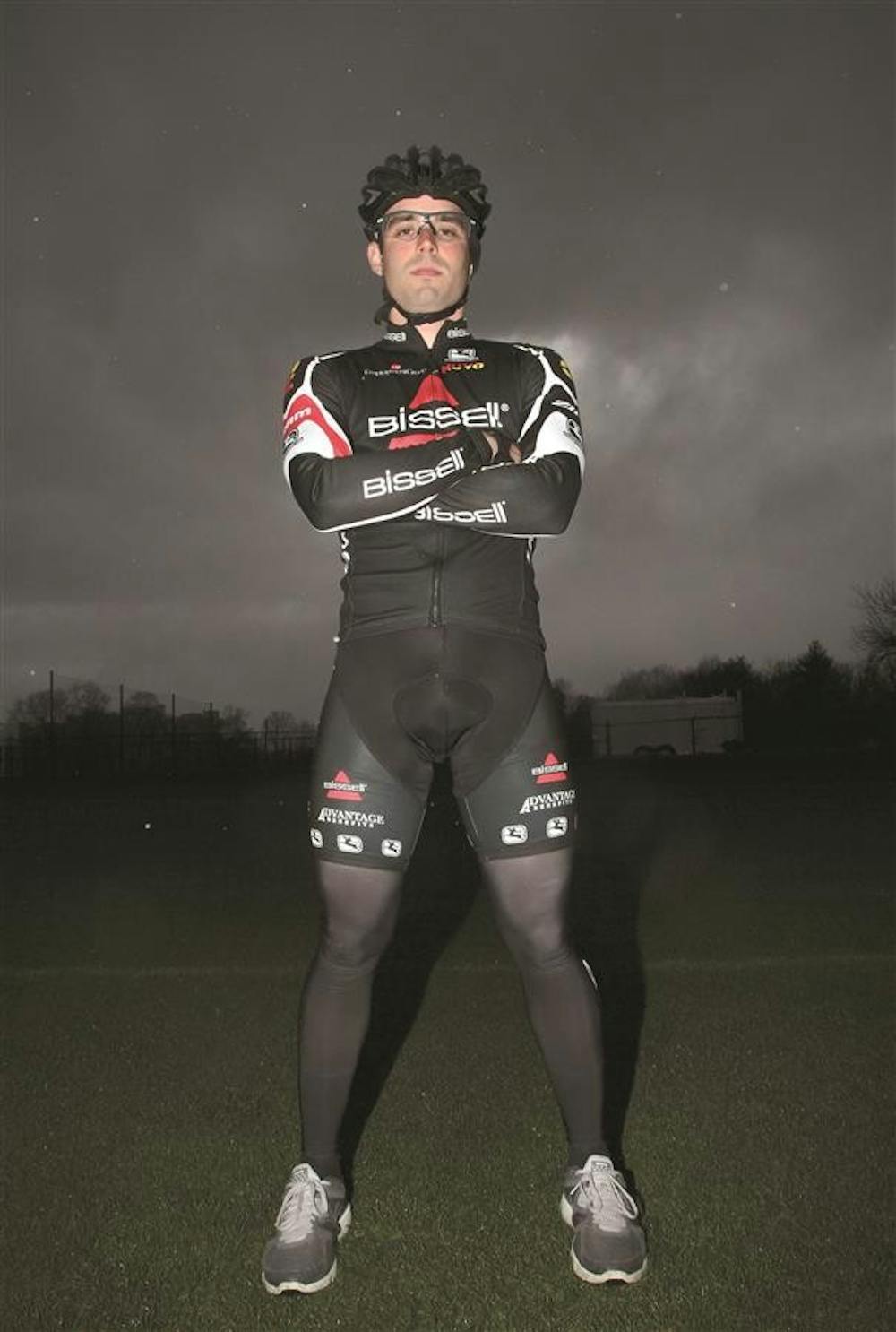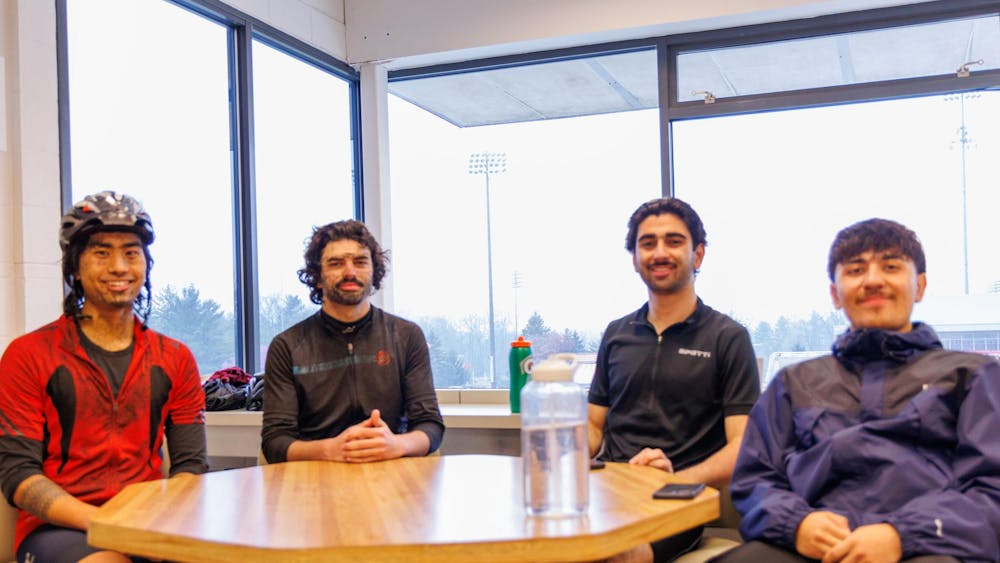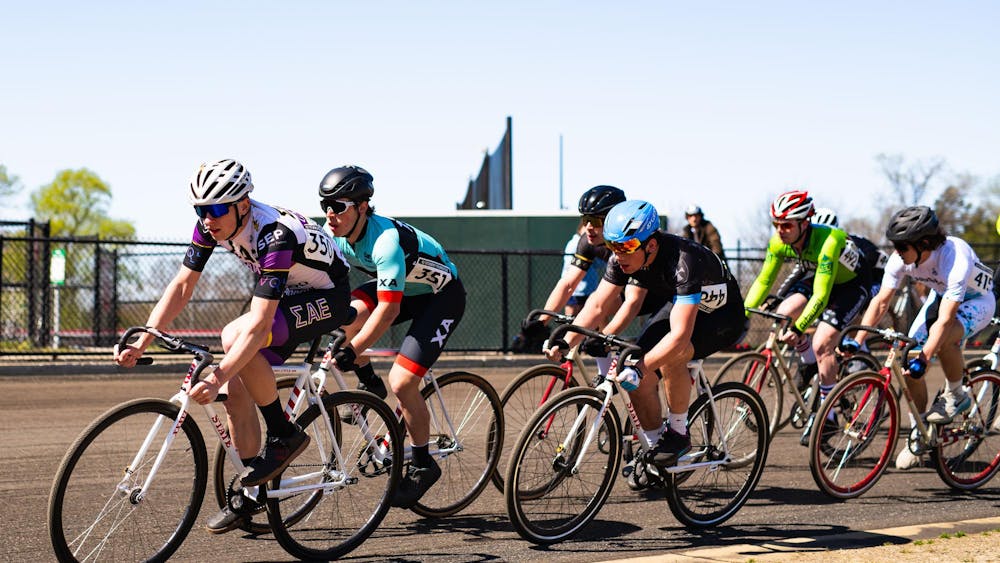Eric Anderson had pondered the same question for weeks. Kevin Depasse couldn’t find the proper words. Paul Smith uttered the biggest superlative he could.
The question was, “What does Little 500 mean to you?”
“That’s probably a hard question to answer for most riders because it means so much more than a bike race,” Depasse said.
Little 500 can’t be reduced to a few words for these three riders. Each trains almost 365 days a year for one day of competition. Each sheds sweat and blood for one shot at glory.
For these three riders, Little 500 is much more than a bike race. It’s a way of life.
And each has made sacrifices along the way to pursue the same goal: to finish April 20 on top of the podium.
These riders, all in the top six at Individual Time Trials, pace their respective teams. Anderson rides for Beta Theta Pi, Depasse for Cutters and Smith for Delta Tau Delta.
The countless hours of work on the track, on the road, on the rollers, on the saddle, on the gym machines have led each one to this moment — this shot to enshrine their name on the BorgWarner Trophy.
None of them have made it without facing an obstacle.
Each has something to prove.
***
Seven years ago, while he sat in his sophomore year physics class at Munster High School, Anderson was attacked by the cycling bug.
He had an uncle who had ridden a year for Sigma Alpha Epsilon in the early ’90s, but Anderson had never really considered riding himself.
In his physics class, he sat next to a girl who was “all excited” about Little 500 champion Alpha Tau Omega because it had rider Steve Ziemba, who graduated from Munster. The girl had a sibling in Ziemba’s grade and felt a connection to him.
From that moment, Anderson started to look at Little 500 a little more seriously.
“That kind of planted the seed,” Anderson said. “Once I got here, that really grew and blossomed. Now I’m here for a fifth year just to try to win this bike race.”
Anderson made quick connections in the cycling community. He met then-Black Key Bulls rider Jordan Bailey the summer before coming to Bloomington. Anderson worked with Bailey’s sister as a counselor at Camp Tecumseh.
He thought he had found his niche with BKB. The team had finished eighth in 2008, and in 2009 — his freshman year — they finished fifth. Anderson didn’t ride in the race as a freshman, but he learned and observed.
“They taught me a lot of what I know about cycling and how to be a good person both on and off the bike,” Anderson said. “A lot of respect for those guys. It was a great experience.”
But it was an experience he would soon leave.
After coming to Bloomington, Anderson’s opinion on the greek system changed. He soon realized through his involvement with IU Dance Marathon that the greek system was something he wanted to join.
In September 2009, he committed to pledging.
When he pledged Beta Theta Pi, he said it had nothing to do with cycling. Beta had qualified in 33rd position in 2009 and finished 29th.
“Pretty much had one of the worst programs in all of greek life,” Anderson said.
BKB understood his reasoning, and Anderson said it was a mutual split that was never ugly.
He then turned his attention to implementing what he learned at BKB into the Beta program.
Through working with BKB and reaching out to Beta alumni, Anderson improved the program to a fifth-place qualification — and a fifth-place finish.
In 2011, Anderson was thrust into being team captain and served on the IU Riders Council. He learned about how to manage all the other responsibilities that come with riding in the race.
While Beta qualified seventh, the team finished 17th.
But the next year, William Kragie joined the team, and it elevated Beta to an elite status. It won the pole in 2012. After finishing seventh last year, the team returns all four riders this year, combining for 14 years of track experience.
But there was a moment Anderson considered not coming back for this race.
He will finish with 215 credit hours and is finishing his fourth degree from the Kelley School of Business. Students can only graduate with three degrees.
“It kind of clicked over the summer that this is something that so few people get the opportunity to do to be coming back to a team where there’s three people, some of my closest friends, who are all doing everything they can to try to win this race,” Anderson said. “It just didn’t feel right leaving that.”
The Betas are back on the pole, trying to prove they can do more than just win on qualifications day.
“I just want to look back and know that we laid it all out there,” Anderson said. “We’re definitely not going to be content to just sit in there and watch the race unfold. We’ve put so much into this.
“To know that we’ve put so much into this and made so many sacrifices and have so many people out there watching us, knowing that we’re representing people literally across the country and around the world, for us to do anything but give it our all out there would be just a complete slap in the face to everybody that’s ever been a part of this program.”
Anderson and Depasse are fifth-year seniors. Anderson will ride in his fourth race and Depasse his third.
The two joke around with each other and enjoy spending time together — except when they’re both on the track.
“There’s a monster inside that you’ve got to have satisfied,” Depasse said. “This is the only avenue for that for the Cutters.”
Depasse knew he would stick around for a fifth year since his sophomore year. He has a competitive edge that still needs to be satisfied after riding in only two races.
He still has work to do.
“It’s a bike race. I want to win,” Depasse said. “We want to win. In my head, it’s the only reason I’m here is to do this. Once it’s over, it’s over.”
Depasse watched two Little 500 races from the bleachers before he decided to get involved. He had been interested in biking after running cross country and track while at Terre Haute North High School, but never took it too seriously. Not until the summer after his sophomore year at IU.
“The second year, it’s like, ‘OK, I want to do this,’” Depasse said. “I saw the Cutters win twice. I wanted to go to the Cutters and ride for them and win.
“I literally just totally committed my whole person to the team. Every ounce went to the team.”
Depasse fit in well with the Cutters from the start. He met their basic requirements. That meant working harder than ever.
“All you have to do is show up and stick around for the workouts,” he said. “That weeds out most people. The only thing it takes to be a Cutter is to show up and commit to something bigger than yourself and not be a dick.
“We’re normal guys. We’re no different than everyone else out there. We just have a different mindset.”
That mindset is a mentality of one. Depasse said it is the mantra of the team. It’s not just a representation of the team’s goal — to win. It is a representation of its
values.
He said former rider Erik Hamilton, who went to Terre Haute North and encouraged Depasse to join the team, got the number “1” tattooed on the underside of his arm below his wrist. His wife did the same.
“It signifies the sense of unity we carry within ourselves,” Hamilton said. “If you’re a Cutter, you’re a Cutter for life. You’re working for this thing that’s bigger than yourself that you can’t explain and don’t care to define because it’s impossible.
“You can’t express into words what being a Cutter is because it’s just too much. That’s what the team is to me.”
Depasse raced in his first year in 2011, his junior year. That year was Eric Young’s senior year. Young won ITTs three years in a row and led the Cutters to four straight Little 500 victories during his four years at IU.
That year, Depasse learned as much as he could from Young.
He translated that to a fourth-place finish at ITTs and helped bring the Cutters a 12th championship.
The next year, without Young, Depasse crashed trying to make a late move in the race around turn four. The team saw its five straight championships come to a close as it finished fourth.
“It was tough,” he said. “You just prepare for as many possible situations as you can and just apply what you know at every moment. We did that, and you’ve got to be happy with that. It sucked to lose, but we did everything we could.”
Depasse has done everything he can in the Spring Series this year to prepare the Cutters for another run at the trophy. He has won ITTs and Miss-N-Out with his teammate Tim Nixon finishing second behind him in both events.
He’s ready to bring winning back to the team this year.
“You join this team to win, but that’s just because you have a winning attitude,” Depasse said. “You want to share that with other people. You don’t want to be selfish. You don’t want to try to make it an individual thing. You commit to the team, and the team will take you wherever you want to go.”
***
Smith has tasted success at the Little 500. But not as a rider.
After getting involved with Wright Cycling his freshman year in fall 2010, Smith realized after the team finished 21st that it just wasn’t going to satisfy his competitive edge.
“I’m a super competitive person,” Smith said. “If I’m going to do something, I want to be able to win at it.”
Smith felt the only option for him was to transfer teams. The only team he really considered was Delta Tau Delta.
“I saw Delts as a team that had been in the top five for about three straight years, and I figured they had the best shot at it the following year,” he said. “So I wanted to come here. I knew there was great coaching, great riders, great alumni support. I really wanted to give it a shot.”
But since he had competed in the race itself for Wright, that meant he would have to sit out the race for Delts in 2012.
That meant a big sacrifice considering Smith had finished with a better ITT time than Depasse in 2012, a time that would have been good enough for fourth.
On race day Smith was reduced to a spectator in the pits as he watched RJ Stuart ride arguably one of the best sets in Little 500 history to bring the Delts their first ever Little 500 trophy.
“It killed me to sit out last year,” Smith said. “I was the student coach. I was in the pit. I loved every minute of it cheering them on and helping them out with anything I possibly could. But at the same time it was just miserable for me to stand on the sideline and really have no control of how the race went down.”
But that year was important for Smith. He got to train under Stuart before Stuart graduated.
“Whether it was going out on the road and having him kick my ass all the time to get me to become a better cyclist, (or) all the experiences in races with strategy,” Smith said. “I learned a lot from him in that way, too.”
Now Smith is faced with filling in Stuart’s shoes. He finished third at ITTs this year, just behind Depasse and Nixon. He said he can’t wait to get back out on the track and prove himself.
“It’ll be nice to be in the race this year and be able to dictate our results,” he said.
Looking back on his decision to transfer and sit out, Smith said he wouldn’t do it any differently. After seeing the team win last year, he said he’s in a good position to help the team back there.
“If it’s going to take me sitting out a year to win, I’m willing to do that,” he said. “I don’t want to go in with the mentality ‘finish top 10, finish top five.’ I think it’s win or go home.”
What the men's riders have to prove

Get stories like this in your inbox
Subscribe




